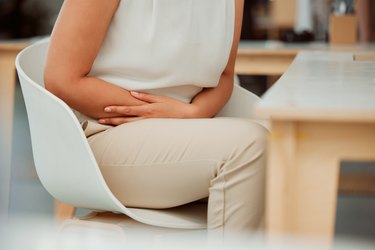
There's a lot you may feel when you're on your period. Cramping. Lower back aches. Breast soreness. Moodiness. Headaches. Fatigue. Those are all considered symptoms of menstruation, per the National Institutes of Health. And together, they can make you pretty darn miserable when Aunt Flo comes for a visit.
Notice we didn't mention nausea? Feeling nauseous on your period can certainly happen, though it's not something everyone experiences, and there's not a lot of data around it, Christine Greves, MD, board-certified ob-gyn at Winnie Palmer Hospital for Women & Babies in Orlando, Florida, tells LIVESTRONG.com.
Video of the Day
Video of the Day
That doesn't necessarily mean something is wrong with you, but there are reasons why you may feel nauseous on your period. Here are four:
1. It’s Your Hormones
Chemicals called prostaglandins are produced in the uterine lining, according to the American College of Obstetricians and Gynecologists (ACOG). These hormone-like substances promote uterine contractions, which you may feel as cramping.
Prostaglandin levels often tend to be high on the first day of your period and then decrease as your period goes on, ACOG notes. This change in prostaglandin levels is a normal part of your cycle, Dr. Greves says. However, in addition to cramps, elevated prostaglandin levels can also cause nausea, vomiting, headaches and breast soreness, she explains.
2. It’s the Pain
You know how we mentioned that higher prostaglandin levels are correlated with cramping? Well, cramping for some people with uteruses can be rather intense and painful. And that pain itself can make you feel nauseous on your period.
"Strong pain can make you feel as if you want to hurl," Dr. Greves says.
3. You Could Have Endometriosis
Having painful periods is called dysmenorrhea, which can be "primary" or "secondary." Primary means there is no discernible cause of the pain. Secondary means the pain can be attributed to other conditions, such as endometriosis.
"Endometriosis is when the lining of the uterus, which sheds every month, can be found in other spots in your body," Dr. Greves says.
Depending on where this tissue is located — such as near the intestines — or the intensity of the pain, you may also feel nauseous.
Other symptoms of endometriosis include pain during bowel movements or urination, as well as pain during sex or heavy menstrual bleeding, according to ACOG.
Tip
Tell your doctor if you think you might have endometriosis. The condition is treatable with certain medications and surgeries, according to the Mayo Clinic.
4. It Could Be an Infection
Another cause of period pain that leads to nausea? Pelvic inflammatory disease (PID), an infection that happens when bacteria from the vagina travels into the uterus, fallopian tubes or ovaries, Dr. Greves explains.
The sexually transmitted infections (STIs) gonorrhea and chlamydia often contribute to PID, per the Centers for Disease Control and Prevention. Bacterial vaginosis can as well, according to Merck Manual.
"PID can cause pain and nausea," Dr. Greves says.
Initial symptoms, per Merck Manual, may be mild pain at first, as well as irregular vaginal bleeding and discharge that's sometimes smelly. As the infection gets worse, you may have a fever in addition to nausea and vomiting.
ACOG points out that symptoms are often vague and missed by health professionals. Diagnosis is made with a pelvic exam.
PID can scar the fallopian tubes, causing infertility, so it's important to see your gynecologist if you have symptoms (which are often treated with antibiotics).
How to Stop Feeling Nauseous on Your Period
If you have pain that causes nausea, start taking an anti-inflammatory pain reliever (such as iburprofen) two days before your period starts, Dr. Greves suggests. "This may help decrease the large amount of prostaglandins circulating during the first days of your period," she explains.
If you're not planning to get pregnant anytime soon, you could also talk to your doctor about starting an oral contraceptive, which could help regulate your hormone levels and ease period cramps and pain, per Planned Parenthood.
If you're vomiting from the nausea, Dr. Greves also stresses the importance of taking in fluids so as not to get dehydrated.
Beyond that, natural remedies for nausea include:
- Eating plain, easy-to-digest foods or cold foods like yogurt
- Going for a walk outside
- Drinking ginger, peppermint or chamomile tea
- Sipping cold seltzer water
- Doing some deep breathing
You don't have to do all of these things, but find which remedies help ease nausea for you and use them as often as needed.
And again, if you suspect you have endometriosis or an infection that's causing nausea, make an appointment with your gynecologist ASAP to get a diagnosis and start treatment.
When to See a Doctor
If you are experiencing symptoms that feel out of the norm — you're bleeding heavily, you have a strange ache in your abdomen and don't know why, sex is painful — see your gynecologist.
So often, pain is sold as a symptom of menstruation that people with periods just have to deal with, but it doesn't have to be that way. "If your quality of life is affected by your menstrual symptoms, whether it's something you've always dealt with or is new, that's the signal to mention it to your doctor," Dr. Greves says.
You know your quality of life is diminished if you start missing out on things or making choices about what you're doing in your day based on period pain or nausea. "We have so many avenues to figure out if there's an underlying cause so we can help make your life better," she says.
Bottom line: Your period shouldn't be what rules your life.
- National Institutes of Health: “What are the symptoms of menstruation?”
- The American College of Obstetricians and Gynecologists: “Endometriosis.”
- The American College of Obstetricians and Gynecologists: “Dysmenorrhea: Painful Periods.”
- Centers for Disease Control and Prevention: “Pelvic Inflammatory Disease (PID) – CDC Basic Fact Sheet.”
- Merck Manual: “Pelvic Inflammatory Disease (PID).”
- The American College of Obstetricians and Gynecologists: “Pelvic Inflammatory Disease (PID).”
- Mayo Clinic: "Endometriosis: Diagnosis and Treatment"
- Planned Parenthood: "What Are the Benefits and Advantages of Birth Control Pills?"
Is this an emergency? If you are experiencing serious medical symptoms, please see the National Library of Medicine’s list of signs you need emergency medical attention or call 911.


